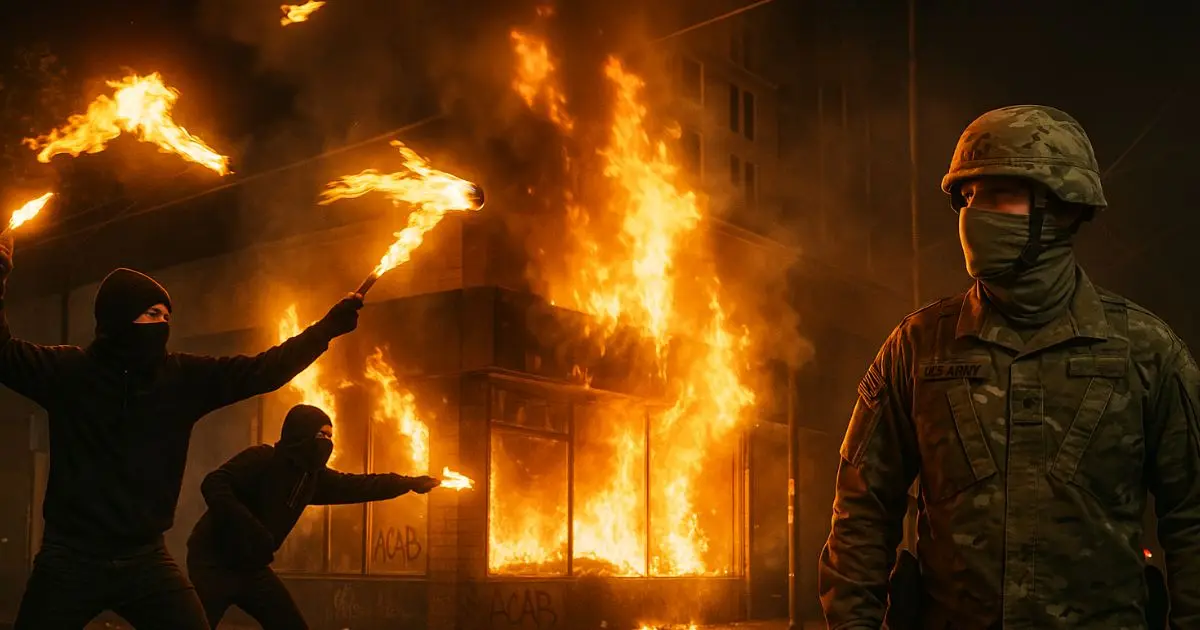PORTLAND — In a development that legal scholars are already calling “peak Portland,” Oregon’s top elected officials have filed suit to stop what they describe as an existential threat to the city’s cherished seasonal industry: artisanal street firecraft. The lawsuit, filed Sunday, seeks to block President Trump’s order federalizing 200 Oregon National Guard members and deploying them to protect federal immigration facilities — an action state leaders say amounts to an outrageous assault on a local micro-economy that, until now, had enjoyed bipartisan admiration for its creative destruction.
“Portland is not a military target,” Governor Tina Kotek reminded the nation, though she conceded she might be open to a UNESCO nomination for the region’s historic expertise in flammable performance art. The governor’s office released documents challenging the memorandum calling up 200 Guard members for up to 60 days — a move the state calls legally and economically ruinous.
President Trump, for his part, announced the deployment on social media and characterized parts of the city as “war-ravaged,” prompting lawyers in Salem to exchange their robes for filing folders and downtown landlords to exchange keys for court notices. The Pentagon memo implementing the orders names the deployment as following the president’s direction to protect federal facilities — an order that state officials say badly misunderstands Portland’s thriving “pop-up conflagration” sector.
Attorney General Dan Rayfield’s filing argues the White House action is unlawful; city officials, meanwhile, argue it will suppress a delicate local ecosystem that feeds cafe owners, performance poets, and the increasingly popular boutique fire-tossing workshop scene. “You can’t just bring in soldiers and expect craft fire to compete,” one satirical memo from the mayor’s office reportedly read.

Locals who still live downtown were quoted as mourning the loss of small-business ambience even as they celebrated the spectacle. “Sure, the shops left last year,” said one anonymous resident, “but they left behind their storefront displays — perfect for a two-for-one Molotov special.” In public comments, state officials insisted that federal protection for ICE facilities would be an unacceptable interference with Portland’s right to maintain a vibrant, if combustible, cultural calendar.
Legal analysts watching the case say it raises novel constitutional questions — about federal authority, state sovereignty, and whether municipal councils may classify riot tourism as an essential industry deserving special protections. Backers of the lawsuit argue not only that the federal call-up is unlawful, but that the optics alone could damage Portland’s brand as a destination for experiential unrest. Opponents of the suit say federal law permits the protection of federal property and personnel, regardless of how trendy the local chaos may be.
As the litigation moves forward, downtown business owners expressed mixed feelings: relief that someone was finally doing something, and irritation that anyone would interrupt the carefully curated calendar of flash-mob bonfires and pop-up infernos. One boutique owner suggested a compromise: a weekend license for controlled arson, renewable annually, with proceeds funding public art and artisanal hot-sauce vendors. Judges and juries, the city hopes, will appreciate nuance.
For now, the question on everyone’s lips is less legal than practical: who will insure Portland’s seasonal spectacles if the federal government insists on sending in uniforms? The state says they’ll see the courts; the president says he’s protecting federal property; Portland will keep selling wristbands for the “Summer of Smolder” memorials. The spectacle, declared one local commentator, will go on — unless a judge rules otherwise, or until the boutique pyrotechnics sector invents a less combustible aesthetic.
— Eugene Voices, Satire Department
This is satire. Nothing here is true—except maybe the parts that sound too ridiculous to be made up.
